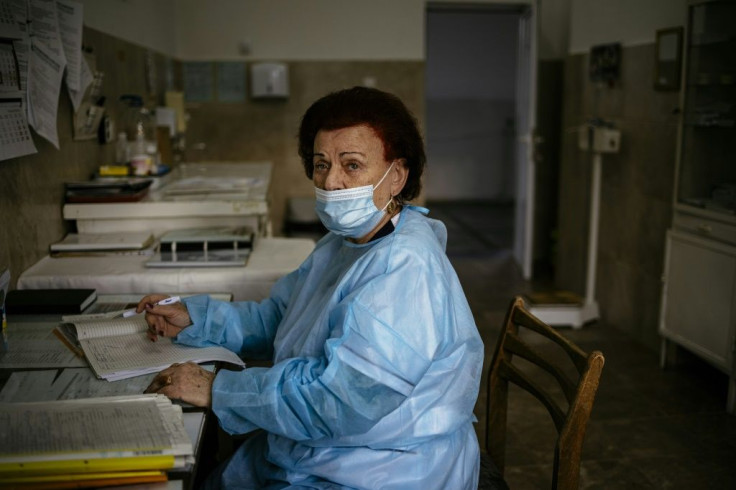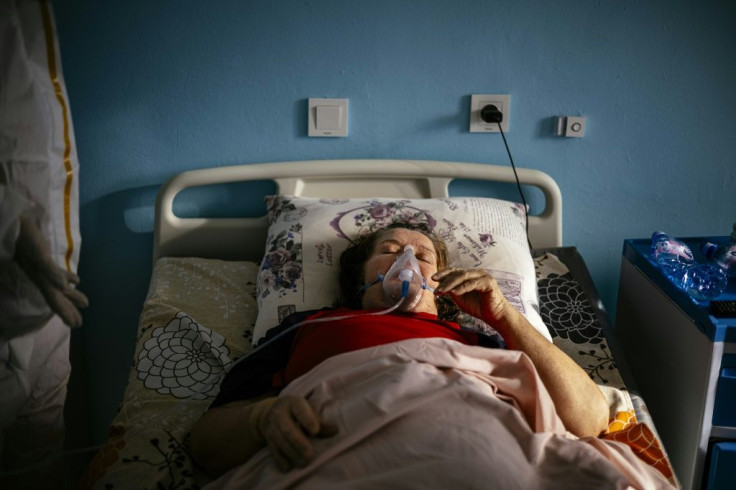One Of Bulgaria's Oldest Doctors Keeps Up Virus Fight
Infectious disease specialist Dr Maria Bogoeva was ready to hang up her scrubs and retire from her post in a small provincial hospital in western Bulgaria when the coronavirus pandemic struck.
A year later, the 82-year-old is still on the Covid-19 frontline despite her age, one of the oldest doctors known to still be practising in the whole country.
She is one of a legion of older medics battling "the horror" of the virus in Bulgaria's overstretched healthcare system.
"My age? I don't feel it. I want to work. If I see that I am no longer useful, I'll bow out," the energetic doctor tells AFP.
She sports ruby red dyed hair, jewellery and a determined look -- she looks after her appearance despite "the daily stress".
"Just because I work in a hospital, doesn't mean that I neglect myself," she smiles.
The European Union's poorest member state suffers from a severe shortage of medical staff as young medical graduates emigrate to the West in search of better career opportunities.
So Bogoeva feels she has little choice but to stay at the bedside of her Covid-19 patients in the municipal hospital in Dupnitsa, some 60 kilometres (40 miles) southwest of the capital Sofia.

To sit at home doing nothing in good health at a time when patients need her expertise the most is simply "unthinkable", she says.
"Was I supposed to let people die? The hospital had no other infection disease specialist, and this amid a healthcare crisis," the doctor explains in a sober voice.
Many other elderly doctors across Bulgaria have made the same choice over the past year, some at the cost of their own lives.
Bogoeva's other colleague at the Dupnitsa hospital infectious ward, another elderly doctor but 15 years younger, feared for her health and retired after the first wave of the virus.
But the octogenarian says she is not afraid to stay on, dressed in a simple surgical mask and a blue overcoat that gets disinfected once in a while.
"They forbid me to approach the patients," the doctor says, standing at the door of a ward.

She determines the right treatment to administer based on patient data collected by the rest of the hospital personnel.
"I probably have some natural immunity. I've lived through so many infections during my life," she says, adding that she feels "no need to panic" about the virus.
Even so, she says there is something "inexplicable" about this virus, and she has seen the devastation it can wreak first-hand.
She shudders at the memory of "the horror of November", when she says she saw "more patients die than during my whole career."
"The people in their sixties, we could not save them," she says.
The hospital was overwhelmed, there were patients "waiting in the hallways", Bogoeva recalls.
"The ambulances, the family doctors were begging us (to admit more patients) but we were over capacity."
She is appreciative of the current respite, with only six patients in her ward, because she knows it will not last long.
A new wave caused by virus variants "is certainly coming," she says, adding firmly: "Well, we will fight it."
In the small town of Dupnitsa, she and other medical workers dealing with the virus encounter fear more often than admiration.
"People avoid us, they look at us as if we are extraterrestrials," she says with bitterness.
In such moments, Bogoeva relies on her family's support, even if from afar.
Her son lives in the United States along with her two grandchildren and three great-grandchildren.
Her husband meanwhile has moved to Sofia until the situation calms down.
"So if I get infected, I will not harm anyone," she sighs.
© Copyright AFP 2024. All rights reserved.




















